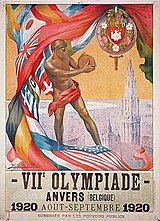
Back Антверпен 1920 Abkhazian Olimpiese Somerspele 1920 Afrikaans Chuegos Olimpicos d'Anvers 1920 AN الألعاب الأولمبية الصيفية 1920 Arabic اوليمبياد صيف 1920 ARZ Xuegos Olímpicos d'Amberes 1920 AST 1920 Yay Olimpiya Oyunları Azerbaijani Olimpiade Masan Panes 1920 BAN Летнія Алімпійскія гульні 1920 Byelorussian Летнія Алімпійскія гульні 1920 году BE-X-OLD
 Poster for the 1920 Summer Olympics | |
| Location | Antwerp, Belgium |
|---|---|
| Nations | 29 |
| Athletes | 2,626 (2,561 men, 65 women) |
| Events | 162[1] in 22 sports (28 disciplines) |
| Opening | 14 August 1920[2] |
| Closing | 12 September 1920 |
| Opened by | |
| Stadium | Olympisch Stadion |
Summer Winter | |
The 1920 Summer Olympics (French: Jeux olympiques d'été de 1920; Dutch: Olympische Zomerspelen van 1920; German: Olympische Sommerspiele 1920), officially known as the Games of the VII Olympiad (French: Jeux de la VIIe olympiade; Dutch: Spelen van de VIIe Olympiade; German: Spiele der VII. Olympiade) and commonly known as Antwerp 1920 (French: Anvers 1920; Dutch and German: Antwerpen 1920), were an international multi-sport event held in 1920 in Antwerp, Belgium.
In March 1912, during the 13th session of the IOC, Belgium's bid to host the 1920 Summer Olympics was made by Baron Édouard de Laveleye, president of the Belgian Olympic Committee and of the Royal Belgian Football Association. No fixed host city was proposed at the time.
The 1916 Summer Olympics, to have been held in Berlin, capital of the German Empire, were cancelled due to World War I. When the Olympic Games resumed after the war, Antwerp was awarded hosting the 1920 Summer Games as tribute to the Belgian people. The aftermath of the war and the Paris Peace Conference, 1919 affected the Olympic Games not only due to new states being created, but also by sanctions against the nations that lost the war and were blamed for starting it. Hungary, Germany, Austria, Bulgaria, and the Ottoman Empire were banned from competing in the Games. Soviet Russia had just emerged from the Civil War and chose not to attend the Games. Germany did not return to Olympic competition until 1928 and instead hosted a series of games called Deutsche Kampfspiele, starting with the Winter edition of 1922 (which predated the first Winter Olympics).
The United States won the most gold and overall medals at the 1920 Summer Games.
- ^ Cite error: The named reference
OLYMPICS1920was invoked but never defined (see the help page). - ^ Findling, John E. (2004). Encyclopedia of the Modern Olympic Movement. Greenwood. p. 74. ISBN 9780313322785.
- ^ "Factsheet - Opening Ceremony of the Games f the Olympiad" (PDF) (Press release). International Olympic Committee. 13 September 2013. Archived (PDF) from the original on 14 August 2016. Retrieved 22 December 2018.